Coordination
Background
Effective coordination can prevent gaps and overlaps in humanitarian responses, ensure the impact of CVA is optimised for the benefit of crisis affected populations, whilst also making the most of limited humanitarian funding. But the CALP Network’s State of the World’s Cash report found that cash coordination is seen as weak and ad hoc, and that this is having serious operational impact.
Ninety-five donors, international and national NGOs, private sector actors and one UN agency have called for clarity on two key issues surrounding cash coordination:
- Who should be accountable for ensuring effective cash coordination, and
- What the scope of Cash Working Groups should be, including in relation to multipurpose cash.
We urgently need to build on what works and provide clarity at the global level on the questions above, whilst adapting to different contexts. Clear decisions based on the impact on affected populations rather than agency politics are long overdue.
Current priorities
We aim to contribute to progress on this issue on three levels: supporting Cash Working Groups at the regional level; contributing to practical solutions for cash coordination at the global level; and convening evidence-based discussion on the key issues, highlighting critical decision points and opportunities for progress.
Featured content

Cash Coordination – LIVE timeline
Page
The latest updates on cash coordination as they unfold.

95 Organisations Sign Letter Calling for Strengthened Cash Coordination
News
Today a letter signed by 95 organisations was handed into the Emergency Relief Coordinator (ERC) urging the Inter-Agency Standing Committee (IASC) to take a decision on the leadership and scope of cash coordination in the coming year.

Is cash transforming the humanitarian system or is the system limiting how cash is used?
Blog Post
At the State of World’s Cash 2020 launch event, Sorcha O’Callaghan, Director of Humanitarian Policy Group at ODI warned that, “Cash offers a huge transformative potential, but as far as the system is privileging the interest of the agencies over people in crisis, we won’t be able to see it”. If you missed the State of the World's Cash 2020 launch we're sharing highlights. Quote 4...
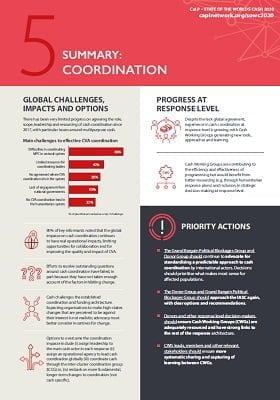
State of the World’s Cash 2020 Chapter 5 summary: Coordination
Report
There has been very limited progress on cash coordination since 2017. Cash continues to challenge the established coordination and funding architecture, and efforts to resolve outstanding questions around cash coordination have failed. Despite the lack of global agreement, Cash Working Groups are pushing forward and contributing to improved programming, and generating new approaches. This...

Cash Coordination Tip Sheet
Guidelines and Tools
This tip sheet sets out established best practice, key guidance and resources for all aspects of cash coordination, intended as a clear, accessible and action-oriented guide for those engaged in coordination of cash and voucher assistance (CVA) at the field level.

Introducing the Cash Coordination Tip Sheet
Webinar
The CALP Network has developed a tipsheet setting out established best practice and key guidance and resources for all aspects of cash coordination, intended as a clear, accessible and action-oriented guide for those engaged in coordination of cash and voucher assistance at the field level.

Cash Coordination: A proposal from members in MENA
Blog Post
Earlier this year the CALP Network undertook regional consultations to explore options for cash coordination. This blog lays out recommendations from participants from the Middle East and North Africa who sketched out what cash coordination, and coordination more broadly, could look like in future to support a more effective, efficient and accountable response.
Thematic lead
Latest

Are Public Works Programmes Effective in Reinforcing Social Protection Systems? Evidence from Northern Namibia
Report
This paper analyses the effectiveness of public works programmes (PWPs) in creating employment, reducing poverty and reinforcing the existing social protection system in Namibia. Using data and information from a survey conducted in northern Namibia, it is established that while public works programmes...

Evaluation of the OneCard Pilot in Lebanon
Report
The OneCard pilot is part of the WFP-UNHCR Joint Plan of Action for Cash and Vouchers (2014), which aims to implement cash and vouchers using common e-delivery mechanisms. The objectives of the OneCard pilot were: To test the programmatic, technical, and financial efficiency and feasibility of the...

A case for cash: crisis and disaster-affected populations’ perspective
Report
As the number, scale and duration of humanitarian crises increase, the provision of cash to affected people and communities presents a number of opportunities for more effective and efficient programming. The means by which such opportunities can be maximised is a source of ongoing debate involving a wide...
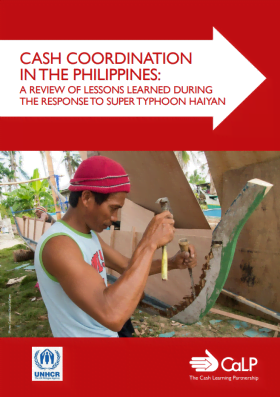
Cash Coordination in the Philippines: A review of lessons learned during the response to Super Typhoon Haiyan
Report
In the last five years there has been a growing trend towards the use of cash transfer programming (CTP) as a response modality in emergencies across the humanitarian sector. The fungibility of cash, when provided without restrictions, offers increased choice for affected populations to...
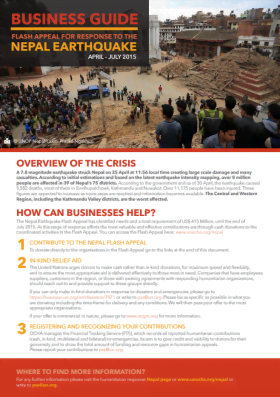
Business Guide – Flash appeal for response to the Nepal earthquake
Policy paper
An overview of the main humanitarian issues facing Nepal following the 2015 Earthquake, as well as indicators as to how businesses can assist with disaster response.

Liberia Ebola Response
Presentation
ICRCs EVD Cash response program had to be designed under a rare circumstance of insufficient baseline data on EVD impact on household level and limited opportunity to contact intended beneficiaries for a detailed assessment/ proper situational analysis.

Cash Transfer and Community Resilience Programming in South Central Somalia
Blog Post
The Building Resilience in Central Somalia (BRCiS) attempts to provide immediate humanitarian assistance as well as developing longer term local capacity through a combination of locally adapted cash-for-work and unconditional cash transfers.

Cash Transfers: Progress made but challenges remain
Blog Post
In five years cash programming has come from almost nowhere to being – for some donors at least – the preferred option, especially in the field of food and nutrition. “We no long measure food aid contributions in wheat/tons equivalent,” says Julia Stewart-David of the EU aid body, ECHO. “That...

Is Cash Transfer Programming ‘Fit for the Future’? – Final Report
Report
This report presents the results of a 2013 research study entitled, Is Cash Transfer Programming ‘Fit for the Future’? The research was commissioned by the the CALP Network and undertaken by the Humanitarian Futures Programme (HFP), King’s College London. The project intends to understand...

Is Cash Transfer Programming ‘Fit for the Future’? – Annexes
Report
This Annex Package contains the full set of products developed in the course of a 2013 research study entitled, Is Cash Transfer Programming ‘Fit for the Future’? The research was commissioned by the Cash Learning Partnership (the CALP Network) and undertaken by the Humanitarian Futures Programme...
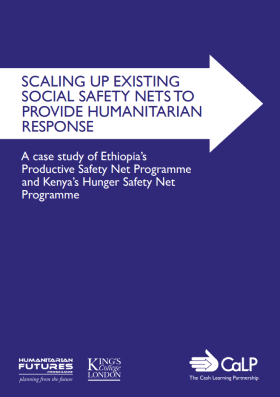
Scaling Up Existing Social Safety Nets to Provide Humanitarian Response: A case study of Ethiopia’s Productive Safety Net Programme and Kenya’s Hunger Safety Net Programme
Policy paper
A case study of Ethiopia’s Productive Safety Net Programme and Kenya’s Hunger Safety Net Programme. This thematic report has been undertaken as part of a 2013 research study entitled, Is Cash Transfer Programming ‘Fit for the Future’? The research was commissioned by the the CALP Network and...
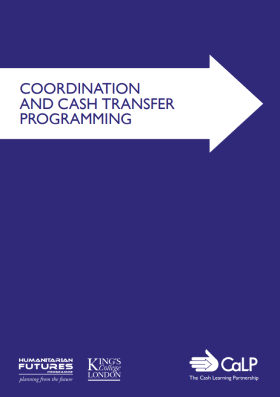
Coordination and Cash Transfer Programming
Policy paper
This thematic report has been undertaken as part of a 2013 research study entitled, Is Cash Transfer Programming ‘Fit for the Future’? The research was commissioned by the the CALP Network and undertaken by the Humanitarian Futures Programme (HFP), King’s College London. The overall...
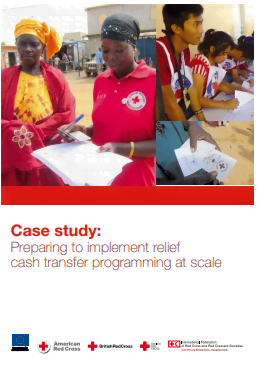
Case Study: Preparing to Implement Relief Cash Transfer Programming at Scale
Case Study
The International Federation of Red Cross and Red Crescent Societies (IFRC) worked with four pilot countries namely the Philippine Red Cross, the Vietnam Red Cross Society, the Senegalese Red Cross Society and the Chilean Red Cross, between May 2012 and December 2013 to support them with training and...

CTP factsheet – Chilean Red Cross – cash transfer preparedness pilot
Report
The IFRC worked with four pilot countries between May 2012 and December 2013 to enable the National Societies to use cash transfer programming to address relief needs at scale, implementing it more rapidly and targeting a larger number of households. The Chilean Red Cross was one of the four...

CTP factsheet – Philippine Red Cross – cash transfer preparedness pilot
Report
The IFRC worked with four pilot countries between May 2012 and December 2013 to enable the National Societies to use cash transfer programming to address relief needs at scale, implementing it more rapidly and targeting a larger number of households. The Philippine Red Cross was one of the four...
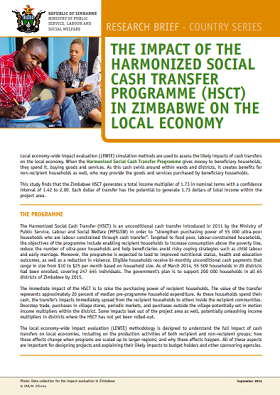
The Impact of the Harmonized Social Cash Transfer Programme (HSCT) in Zimbabwe on the Local Economy
Report
Local economy-wide impact evaluation (LEWIE) simulation methods are used to assess the likely impacts of cash transfers on the local economy. When the Harmonized Social Cash Transfer Programme gives money to beneficiary households, they spend it, buying goods and services. As this cash swirls around...
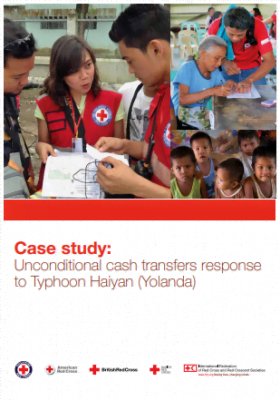
Case Study: Unconditional cash transfers response to Typhoon Haiyan (Yolanda)
Report
Typhoon Haiyan, the most powerful storm ever recorded, first made landfall in the morning of 8 November 2013 in Guiuan, Eastern Samar province, causing extensive damage to life, housing, livelihoods and infrastructure across nine of the Philippines’ provinces. The islands of Leyte and Samar were among...

Cash Transfers and HIV Prevention
Report
This paper proposes some initial principles on how to optimize HIV impacts of cash transfers, by encouraging targeting that: focuses on communities with high rates of new HIV infections, particularly acquired via sexual transmission; reduces local or community levels of economic inequalities between men...
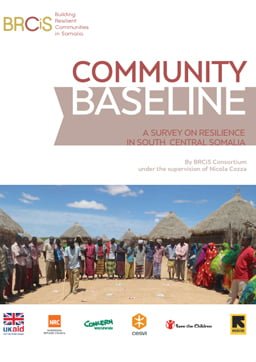
Community Baseline: A Survey On Resilience In South Central Somalia
Report
A comprehensive understanding of the socio-economic and environmental context of intervention is essential to the success of any resilience-building program. Based on this premise, the BRCiS has taken a series of steps to strengthen its knowledge and understanding of key variables and dynamics in its...

Community Baseline: A Survey On Resilience In South Central Somalia Summary
Report
A comprehensive understanding of the socio-economic and environmental context of intervention is essential to the success of any resilience-building program. Based on this premise, the BRCiS has taken a series of steps to strengthen its knowledge and understanding of key variables and dynamics in its...
